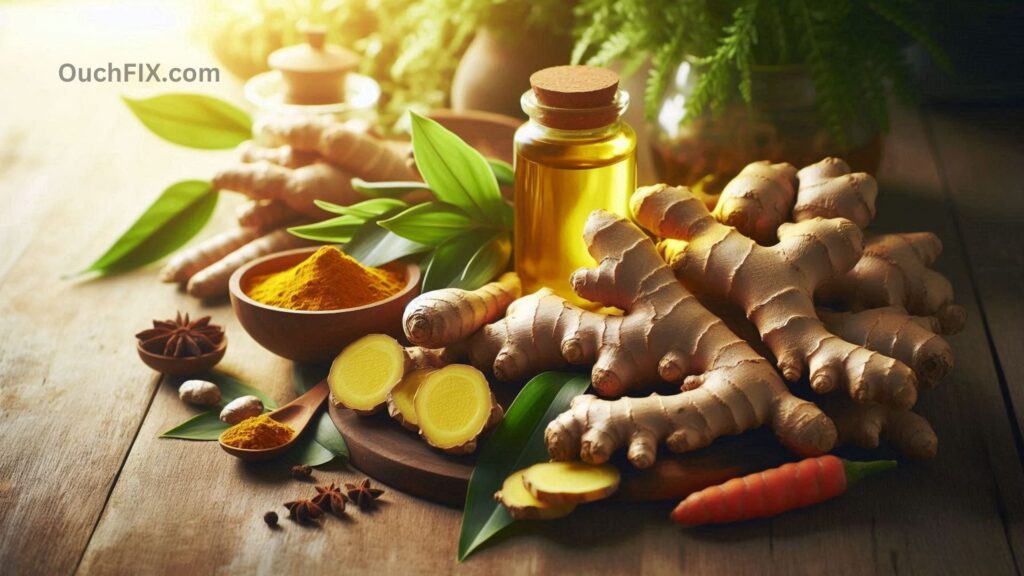Ginger is more than just a flavorful spice—it’s a natural powerhouse packed with health benefits. With its anti-inflammatory, antioxidant, and anti-nausea properties, ginger may help with weight management, joint pain, menstrual discomfort, and even heart and brain health.
Native to Southeast Asia, ginger comes from the rhizome (underground stem) of a flowering plant related to turmeric, cardamom, and galangal. While we often call it “ginger root,” the rhizome is where all the medicinal magic happens.
You can enjoy ginger fresh, dried, powdered, or as oil and juice. It’s a versatile ingredient in cooking, home remedies, and even beauty products.
Here’s an in-depth look at what makes ginger so remarkable and how to use it safely.
11 Science-Backed Health Benefits of Ginger

1. Powerful Medicinal Properties
Ginger has been a cornerstone of traditional medicine for centuries, used to aid digestion, reduce nausea, and fight colds and flu. Its primary active compound, gingerol, gives ginger its pungent flavor and many of its health benefits.
Research highlights gingerol’s strong anti-inflammatory and antioxidant effects, which may help combat oxidative stress, support the immune system, and reduce chronic inflammation.
Expert Tip: Incorporating fresh ginger into your daily meals or teas can help you reap these benefits naturally.
2. Eases Nausea and Morning Sickness
Ginger is widely recognized for reducing nausea, including:
- Morning sickness during pregnancy
- Post-surgery nausea
- Chemotherapy-induced nausea
Studies suggest that 1–1.5 grams of ginger daily can significantly ease nausea. However, pregnant women should consult their healthcare provider before taking large doses.
Pro Tip: Try ginger tea or add grated ginger to smoothies for gentle, natural relief.

Also Read: How can I Relieve Joint Pain at Home with Natural Ingredients?
3. May Aid Weight Loss

Ginger may support weight management by boosting metabolism and reducing inflammation. A 2019 review found that ginger supplementation helped reduce body weight and waist-to-hip ratios in overweight adults.
How to Use:
- Add fresh ginger to meals
- Drink ginger-infused water or tea before meals
- Combine with other metabolism-boosting foods like cayenne or green tea
While not a miracle cure, ginger can complement a balanced diet and regular exercise.
4. Helps with Osteoarthritis
Osteoarthritis causes joint pain, stiffness, and reduced mobility. Research shows that 0.5–1 gram of ginger daily may help alleviate these symptoms, particularly in the knees.
Note: Some people may experience mild stomach upset or dislike the strong taste.
Tip: Ginger capsules or extracts can be a convenient alternative if you’re sensitive to the taste.
5. May Lower Blood Sugar and Improve Heart Health

Ginger has promising anti-diabetic effects. Studies indicate that individuals with type 2 diabetes who took ginger supplements had lower fasting blood sugar and improved HbA1c levels.
It may also support heart health by:
- Lowering LDL (“bad”) cholesterol
- Reducing triglycerides
- Increasing HDL (“good”) cholesterol
Reference: Healthline on Ginger and Heart Health
6. Supports Digestion and Eases Indigestion
Ginger may help food move more efficiently through the stomach, reducing bloating and discomfort. Research shows it can be effective for indigestion, especially when combined with ingredients like artichoke extract.
Usage Idea: Add fresh ginger to soups or teas after heavy meals to improve digestion naturally.

Also Read: What Practices Aid Recovery After a Sprain?
7. May Reduce Menstrual Pain

Ginger has been found to help with period pain. Some research even suggests it can be as effective as over-the-counter pain relievers like ibuprofen.
8. Can Help Lower Cholesterol
High LDL (“bad”) cholesterol is linked to heart disease, but ginger might help. A 2022 review found that ginger consumption significantly reduced LDL cholesterol and triglycerides while boosting HDL (“good”) cholesterol.
9. Might Reduce Cancer Risk

Ginger’s antioxidants may protect against certain cancers, particularly those of the digestive system. Studies suggest that gingerol and related compounds could slow the growth of colorectal, pancreatic, and liver cancer cells, though more research in humans is needed.
Reference: Wikipedia: Ginger
10. May Boost Brain Function and Protect Against Alzheimer’s
Chronic inflammation and oxidative stress contribute to brain aging and neurodegenerative diseases. Ginger’s antioxidants may:
- Reduce brain inflammation
- Support cognitive function
- Potentially protect against Alzheimer’s disease
Expert Tip: Add ginger to your diet alongside other brain-boosting foods like berries, nuts, and fatty fish.

Also Read: How does Sleep Affect Recovery from Physical Injuries?

11. Fights Infections
Ginger has natural antimicrobial properties, helping fight bacteria and fungi. Lab studies show effectiveness against common pathogens such as E. coli and Candida albicans.
Usage: Incorporate fresh or powdered ginger into meals, teas, or smoothies to support your immune system.
Possible Side Effects
For most people, ginger is safe when consumed in moderation. Large doses may cause:
- Stomach discomfort
- Heartburn
- Diarrhea
- Throat irritation
Pregnant and breastfeeding individuals should consult their doctor before taking high doses.
How to Use Ginger Daily
- Tea: Steep fresh slices in hot water
- Cooking: Add to stir-fries, soups, and marinades
- Supplements: Capsules or extracts for targeted doses
- Juice: Mix with other fruit or vegetable juices
Tip: Fresh ginger retains the highest gingerol content, making it the most effective form for medicinal purposes.
Conclusion
Ginger is a versatile, nutrient-rich root with a wide range of health benefits, from easing nausea to supporting heart and brain health. Whether you add it to your meals, sip it as tea, or take supplements, incorporating ginger into your daily routine can be a simple yet effective step toward better overall health.
CTA: Start adding fresh ginger to your diet today—try a warm cup of ginger tea or sprinkle it into your favorite dishes to enjoy its incredible benefits!
FAQs About Ginger
Q1. Can ginger help with weight loss?
Yes, it may support metabolism and reduce inflammation, which can aid weight management when combined with diet and exercise.
Q2. Is ginger safe during pregnancy?
Moderate amounts are generally safe, but consult your doctor before taking large doses, especially for nausea.
Q3. How much ginger should I consume daily?
Typically, 1–2 grams of fresh ginger or 0.5–1 gram of powdered ginger is safe for adults.
Q4. Can ginger reduce cholesterol?
Yes, research shows it can lower LDL and triglycerides while increasing HDL cholesterol.
Q5. Does ginger help with arthritis pain?
Ginger may reduce inflammation and ease joint pain, particularly in osteoarthritis.




